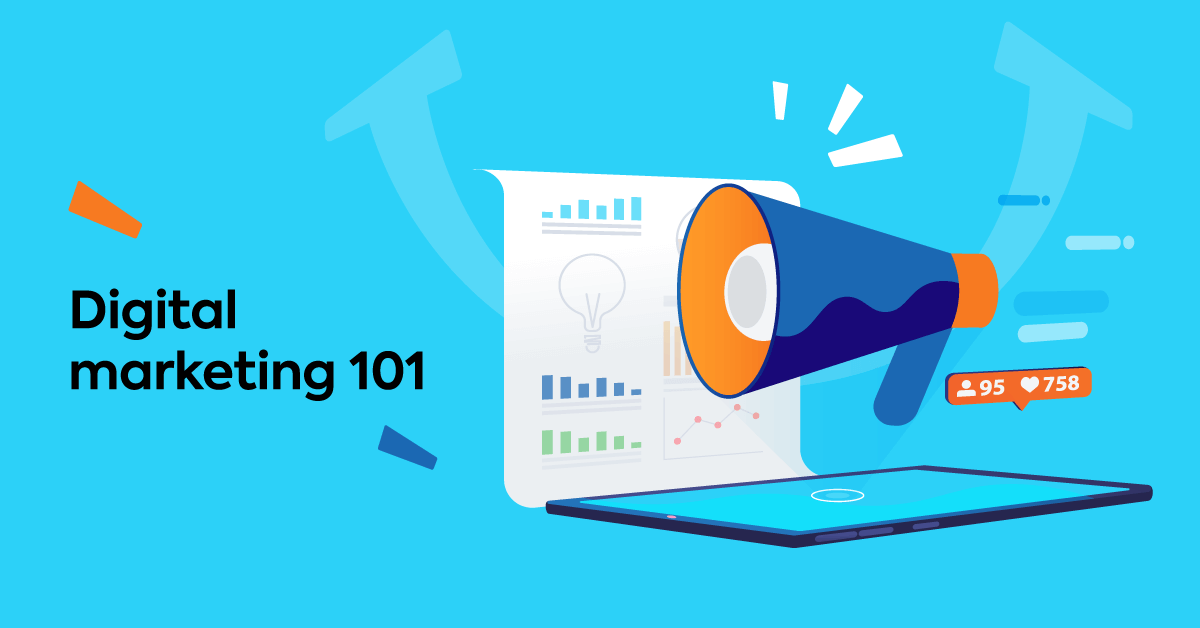Since the birth of the internet in the early 90s, digital marketing has become a popular career choice. With new platforms, trends, and technologies emerging all the time, the excitement and variety of the profession is a big draw for many. But it can prove a challenge when it comes to training.
Digital marketing covers many different specialist skills, with new ones being added all the time. To keep pace and remain relevant, your digital marketing skills training program needs to be one step ahead.
To help you design a future-focused training program that reflects the richness and variety of the role, we’ve pinpointed 8 key skills you should include. Use them to make sure your teams are up-to-date. And add in new courses to meet industry developments as and when they emerge.
Digital marketing training: Who’s it for?
Despite its popularity, there’s actually a digital marketing skills gap affecting workforces worldwide. Why? Because the training delivered by many education settings isn’t meeting the breadth or depth of expertise required by businesses.
Faced with this shortfall, many employers are providing extra digital skills training in-house. And by doing so, it’s not only their digital marketing professionals who are benefiting. Here are some of the groups getting added value from this progressive approach:
Digital marketers
You might be wondering: Don’t they already have the essential digital marketing skills? Not necessarily.
Perhaps you’ve hired an experienced digital marketer who just needs upskilling in one area. Maybe you’ve taken on a recent graduate who needs to consolidate their academic learning. Or, welcomed back someone from parental leave who needs to update their skills in line with industry developments.
With your own digital marketing training courses in place, you’re all set up to cater to each of these very different groups.
Marketing professionals without digital skills
Marketing was around before the internet. Give your traditional marketing experts the chance to add digital marketing skills to their rich and already-proven portfolio of marketing skills.
They won’t need to start from scratch as they’re already familiar with common industry terms and best practices. But they’ll likely benefit from training on specific tools and techniques.
Customer service and support agents
Your customer service and support teams are the face of your company, interacting with customers and prospects on a daily basis.
They don’t need to be experts in every area of digital marketing. But could benefit from subsets such as branding, social media marketing skills, and understanding customer needs.
Sales teams
The primary function of marketing is to create leads, which generate customers. Selling your brand and your offering, your sales team are lead-generating, frontline marketers too.
Which is why, just like your support team, it’s worth investing in digital marketing skills such as networking, branding, and social media.
Recruitment and HR specialists
Employer branding is a big part of hiring. Why would someone choose to work for you over another company? The answer lies in your recruitment marketing.
Teach your HR and recruitment specialists how to become brand ambassadors by giving them the digital marketing skills training that supports this.

The top 8 digital marketing skills
Digital marketing has many faces to it. But there are a few standout areas that you should consider when designing digital marketing training courses. Here are our top 8 “How to” digital marketing picks:
1. How to: Drive traffic to your website
There are two main methods for marketing your website—SEO (search engine optimization) and PPC (pay-per-click). Having an on-point strategy for both will increase the quantity and quality of internet traffic and should be a key part of your overall marketing strategy.
Many companies employ experts to work specifically in this area to manage and optimize campaigns. But team leaders and senior managers from other departments, too, can grow their own knowledge of this specialist area by participating in digital marketing skills training. For example, an HR manager could learn how PPC ads could target and drive more candidates to the company’s career page.
2. How to: Maximize social media
Over half of the world’s population use social media. And a marketing team without social media skills doesn’t stand much chance of making an impression at all, let alone where it matters.
Social media skills training will help your marketers decide what platforms are right for your business. And give them the knowledge to design and create targeted content, tailored to each platform, which will drive engagement, grow a following, and encourage sharing.
And it doesn’t need to stop there. Expand your social media marketing skills to include your sales, support, and HR teams that use these platforms to connect with customers, prospects, and potential new hires.
Meet TalentLibrary™
A growing collection of ready-made courses that cover the skills
your teams need for success at work
![]()

3. How to: Optimize processes with digital technology
In today’s global economy, business never stops. Which means marketing needs to keep pace, too. Digital optimization is about using the right tech to improve how things are done. It ensures the right markets are targeted at the right time, and in the right way.
For your leaders or marketing execs, understanding digital optimization, and where and how to use it, will streamline their marketing strategy and boost their campaigns. That’s why it’s considered the cornerstone of all good digital marketing training courses.
4. How to: Brand your business
How your employees talk about your company across the digital world matters. It will either resonate with customers and prospects or alienate them.
The same goes for the type of content you share. Knowing how to build your brand’s voice by creating and sharing the right content and using the right language is important—not just for your marketers, but for those working in other customer-facing areas like sales or support. A course on content marketing could also be useful for HR professionals who’re managing recruitment marketing and employee engagement projects.
5. How to: Run effective email campaigns
Digital technology continues to provide new ways of communicating. But emails are still going strong; rising above the crowd to deliver the most impactful and effective marketing campaigns.
Effective email marketing will help you connect with customers, increase your conversion rates, and gain loyal customers. So, when it comes to developing digital marketing skills, don’t forget to include email marketing in your training package.
But emails are not just for external audiences. Your HR or L&D team, for example, might want to set an email campaign to market training programs and engage employees to increase participation. In that case, a quick course on email marketing could help craft targeted messages.
6. How to: Automate to free up time
Some marketing tasks need creativity, concentration, and the human touch. Others are repetitive, require less input, and can be programmed to run automatically.
Investing time to pinpoint tasks that can be automated once will save you time in the future. And, including marketing automation as one of your digital marketing training courses, will give your marketers the skills they need to set up automations and integrate them into your marketing strategy.
7. How to: Build brand ambassadors
A brand ambassador is a customer who promotes your product, service, or company for you. They’re incredibly powerful when it comes to digital marketing. But they need to be the right type of ambassador for your brand.
Knowing how to choose the right person and establish a successful brand ambassador program takes a specific set of skills. This is where your digital marketing skills training comes in.
8. How to: Curate content
When it comes to marketing, creating content from scratch every time can be difficult and time-consuming. But there’s an alternative: curating content. This means, sharing other people’s content instead of creating your own—a common practice, especially on social media.
But there’s a method for getting it right. Help your marketing professionals understand how to correctly curate content for your audience by integrating it into your training for marketing professionals.
Train your marketing professionals with TalentLMS
The training platform that users consistently rank #1.
Easy to set up, easy to use, easy to customize.
Tips to deliver your digital marketing training
Digital marketing’s about maximizing the power of technology. And this needs to be reflected in the way you deliver your digital marketing training. In short, this means using an online training platform.
Not only does this support the overarching message that technology is transformative. But it allows you to provide a flexible, accessible, and interactive approach to achieving collective learning outcomes.
That said, here are a few specific ways you can expand on this digital-first approach:
- Empower in-house experts: If you’re lucky enough to have digital marketing experts in your organization (in areas such as PPC or SEO, for example), set up webinars so they can share their knowledge and answer questions.
- Invite external experts: Digital training platforms bring people together. If you don’t have your own digital marketing experts, use specialists outside your organization (wherever they are in the world) and invite them to host live, online learning sessions.
- Create a peer learning program: Encourage your marketers to share insights, best practices, tips, and experiences with people in other teams (sales, support, and HR, for example) who could benefit.
- Support microlearning: Time can be the enemy of training. Segment your courses up into manageable chunks that can be completed as and when your employees have spare time.
- Engage with gamification: Use simulations and interactive activities to consolidate learning. Games are not just a more fun way of learning, but they also turn learners into active participants.
- Provide resources: Collate a digital library of resources your students can use when they want to grow their knowledge, refresh their memory, and put their training in context.
- Facilitate connections: Set up social media groups and discussion boards your learners can use to post resource links, share ideas, ask questions, and find answers.
You’re in control
Of course, every organization’s unique. And how you want or need digital marketing to work for you will depend on your goals and priorities. The beauty of designing and delivering your own digital marketing training courses is that you can customize your program and pick the topics that make the most sense. By doing so, stand a better chance of achieving the successes you need.
So, whether it’s building up brand loyalty, driving online sales or generating leads, upskilling digital marketers, or growing digital skills in other areas of your business, the direction you take is in your hands.



